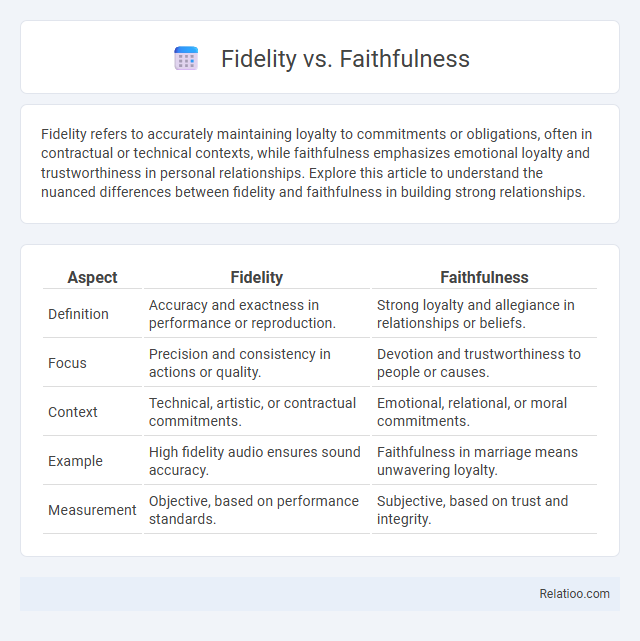Fidelity refers to accurately maintaining loyalty to commitments or obligations, often in contractual or technical contexts, while faithfulness emphasizes emotional loyalty and trustworthiness in personal relationships. Explore this article to understand the nuanced differences between fidelity and faithfulness in building strong relationships.
Table of Comparison
| Aspect | Fidelity | Faithfulness |
|---|---|---|
| Definition | Accuracy and exactness in performance or reproduction. | Strong loyalty and allegiance in relationships or beliefs. |
| Focus | Precision and consistency in actions or quality. | Devotion and trustworthiness to people or causes. |
| Context | Technical, artistic, or contractual commitments. | Emotional, relational, or moral commitments. |
| Example | High fidelity audio ensures sound accuracy. | Faithfulness in marriage means unwavering loyalty. |
| Measurement | Objective, based on performance standards. | Subjective, based on trust and integrity. |
Understanding Fidelity and Faithfulness: Key Differences
Fidelity and faithfulness both relate to loyalty and trust but differ in scope and application; fidelity typically refers to accuracy and precision in relationships or commitments, especially in contexts like audio quality or data transmission, while faithfulness emphasizes steadfast loyalty and reliability, often in personal or emotional relationships. Understanding these distinctions helps clarify expectations in your commitments, ensuring you recognize whether accuracy or loyalty is prioritized. Choosing the right term depends on whether your focus is on exactness or unwavering devotion.
Historical Perspectives on Fidelity and Faithfulness
Historical perspectives on fidelity and faithfulness reveal nuanced distinctions rooted in cultural and social contexts. Fidelity traditionally referred to loyalty and accuracy in duties or promises, often emphasized in marital and legal settings, while faithfulness encompassed a broader spiritual or emotional allegiance, particularly in religious texts and moral philosophy. Understanding these historical connotations can deepen your appreciation of how these concepts influence modern interpretations of trust and commitment.
Fidelity in Relationships: What Does It Mean?
Fidelity in relationships refers to the unwavering commitment and loyalty partners maintain towards each other, ensuring trust and emotional security. It encompasses faithfulness in actions and intentions, maintaining exclusivity and honoring agreed-upon boundaries. Your understanding of fidelity strengthens the foundation of trust essential for lasting intimacy and mutual respect.
Faithfulness: Beyond Romantic Commitment
Faithfulness extends beyond romantic commitment, encompassing loyalty, reliability, and consistency in various relationships such as friendships, family bonds, and professional connections. It reflects a deeper ethical and emotional integrity, demonstrating adherence to promises, trustworthiness, and moral principles. Unlike fidelity, which often emphasizes sexual exclusivity or accuracy, faithfulness highlights ongoing devotion and steadfast support across diverse contexts.
Psychological Foundations of Fidelity and Faithfulness
Psychological foundations of fidelity and faithfulness center on trust, emotional commitment, and consistency in relationships, reflecting an individual's reliability and adherence to shared values or promises. Fidelity typically emphasizes accuracy and exactness in maintaining promises or duties, often linked to cognitive processes and moral integrity. Faithfulness incorporates emotional loyalty and devotion, rooted in attachment theory and the psychological need for security and belonging within interpersonal connections.
Cultural Interpretations: Fidelity vs Faithfulness
Cultural interpretations of fidelity and faithfulness often differ, with fidelity frequently emphasizing loyalty to commitments in relationships or contracts, while faithfulness is deeply rooted in moral and emotional dedication, particularly in religious or spiritual contexts. In many cultures, your understanding of faithfulness involves unwavering allegiance to beliefs or values, whereas fidelity highlights consistent adherence to formal agreements or roles. These distinctions influence how trust and reliability are perceived and valued within various social and cultural frameworks.
Signs of Fidelity and Faithfulness in Modern Relationships
Signs of fidelity in modern relationships include consistent loyalty, transparent communication, and unwavering commitment to shared goals. Faithfulness is demonstrated through emotional support, reliability in both presence and actions, and respecting boundaries set by partners. Observing trustworthiness and mutual respect are critical indicators distinguishing both fidelity and faithfulness in sustaining healthy partnerships.
The Impact of Trust on Fidelity and Faithfulness
Trust fundamentally influences both fidelity and faithfulness by reinforcing commitment and reliability in relationships. High levels of trust promote consistent fidelity, ensuring loyalty in actions and decisions, while also fostering faithfulness, which reflects emotional dedication and honesty. The interplay between trust and these concepts solidifies bonds, reduces conflicts, and enhances long-term relationship stability.
Challenges to Maintaining Fidelity and Faithfulness
Maintaining fidelity and faithfulness presents challenges such as navigating trust issues, managing emotional vulnerabilities, and overcoming external temptations that test commitment. You must prioritize open communication and consistent effort to uphold these values in your relationships. Balancing personal desires with loyalty often requires resilience and mutual understanding to sustain long-term fidelity and faithfulness.
Building Strong Relationships through Fidelity and Faithfulness
Building strong relationships requires unwavering fidelity and deep faithfulness, which create trust and emotional security between partners. Fidelity emphasizes loyalty and commitment to your partner, ensuring consistency in actions and intentions, while faithfulness strengthens emotional bonds through honesty and support. Together, fidelity and faithfulness form the foundation for lasting connections by promoting mutual respect and reliability.

Infographic: Fidelity vs Faithfulness
 relatioo.com
relatioo.com